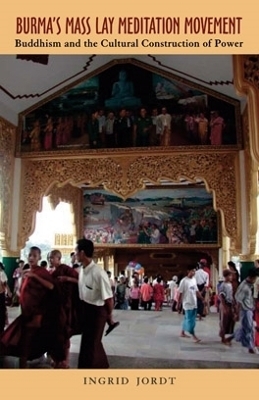
Burma’s Mass Lay Meditation Movement
Buddhism and the Cultural Construction of Power
Seiten
2007
Ohio University Press (Verlag)
978-0-89680-255-1 (ISBN)
Ohio University Press (Verlag)
978-0-89680-255-1 (ISBN)
Burma’s Mass Lay Meditation Movement: Buddhism and the Cultural Construction of Power describes a transformation in Buddhist practice in contemporary Burma. This revitalization movement has had real consequences for how the oppressive military junta, in power since the early 1960s, governs the country.Drawing
Burma’s Mass Lay Meditation Movement: Buddhism and the Cultural Construction of Power describes a transformation in Buddhist practice in contemporary Burma. This revitalization movement has had real consequences for how the oppressive military junta, in power since the early 1960s, governs the country.
Drawing on more than ten years of extensive fieldwork in Burma, Ingrid Jordt explains how vipassanā meditation has brought about a change of worldview for millions of individuals, enabling them to think and act independently of the totalitarian regime. She addresses human rights as well as the relationship between politics and religion in a country in which neither the government nor the people clearly separates the two. Jordt explains how the movement has been successful in its challenge to the Burmese military dictatorship where democratically inspired resistance movements have failed.
Jordt’s unsurpassed access to the centers of political and religious power in Burma becomes the reader’s opportunity to witness the political workings of one of the world’s most secretive and tyrannically ruled countries. Burma’s Mass Lay Meditation Movement is a valuable contribution to Buddhist studies as well as anthropology, religious studies, and political science.
Burma’s Mass Lay Meditation Movement: Buddhism and the Cultural Construction of Power describes a transformation in Buddhist practice in contemporary Burma. This revitalization movement has had real consequences for how the oppressive military junta, in power since the early 1960s, governs the country.
Drawing on more than ten years of extensive fieldwork in Burma, Ingrid Jordt explains how vipassanā meditation has brought about a change of worldview for millions of individuals, enabling them to think and act independently of the totalitarian regime. She addresses human rights as well as the relationship between politics and religion in a country in which neither the government nor the people clearly separates the two. Jordt explains how the movement has been successful in its challenge to the Burmese military dictatorship where democratically inspired resistance movements have failed.
Jordt’s unsurpassed access to the centers of political and religious power in Burma becomes the reader’s opportunity to witness the political workings of one of the world’s most secretive and tyrannically ruled countries. Burma’s Mass Lay Meditation Movement is a valuable contribution to Buddhist studies as well as anthropology, religious studies, and political science.
Ingrid Jordt is an associate professor of anthropology at the University of Wisconsin, Milwaukee. She has conducted research in Burma since 1988.
| Reihe/Serie | Research in International Studies, Southeast Asia Series |
|---|---|
| Verlagsort | Athens |
| Sprache | englisch |
| Maße | 140 x 216 mm |
| Themenwelt | Geisteswissenschaften ► Religion / Theologie ► Buddhismus |
| Sozialwissenschaften ► Ethnologie | |
| Sozialwissenschaften ► Soziologie ► Spezielle Soziologien | |
| ISBN-10 | 0-89680-255-8 / 0896802558 |
| ISBN-13 | 978-0-89680-255-1 / 9780896802551 |
| Zustand | Neuware |
| Haben Sie eine Frage zum Produkt? |
Mehr entdecken
aus dem Bereich
aus dem Bereich
Philosophische Betrachtungen
Buch | Softcover (2024)
Aufbau TB (Verlag)
CHF 20,95
Unterweisungen in Zen-Meditation
Buch | Hardcover (2024)
Arkana (Verlag)
CHF 29,90


